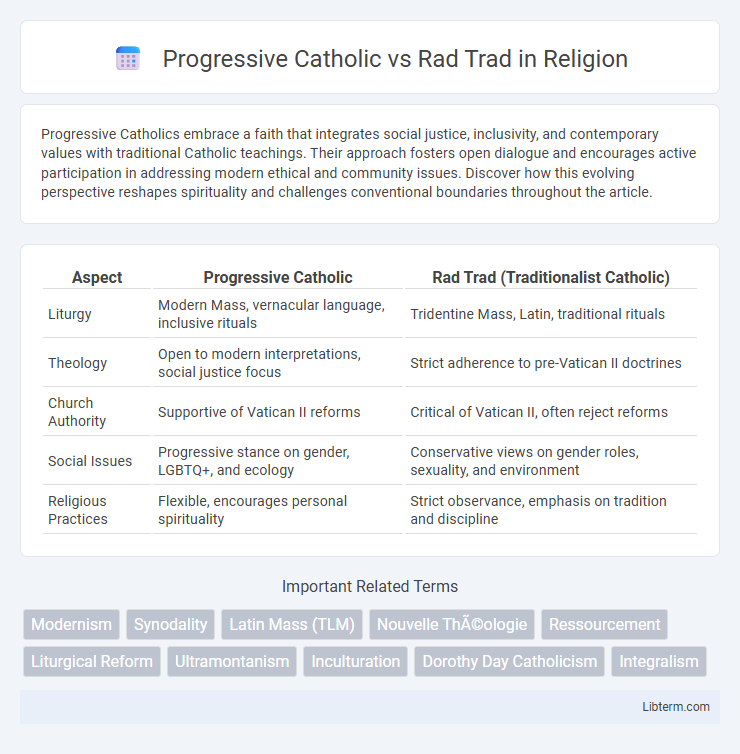Progressive Catholics embrace a faith that integrates social justice, inclusivity, and contemporary values with traditional Catholic teachings. Their approach fosters open dialogue and encourages active participation in addressing modern ethical and community issues. Discover how this evolving perspective reshapes spirituality and challenges conventional boundaries throughout the article.
Table of Comparison
| Aspect | Progressive Catholic | Rad Trad (Traditionalist Catholic) |
|---|---|---|
| Liturgy | Modern Mass, vernacular language, inclusive rituals | Tridentine Mass, Latin, traditional rituals |
| Theology | Open to modern interpretations, social justice focus | Strict adherence to pre-Vatican II doctrines |
| Church Authority | Supportive of Vatican II reforms | Critical of Vatican II, often reject reforms |
| Social Issues | Progressive stance on gender, LGBTQ+, and ecology | Conservative views on gender roles, sexuality, and environment |
| Religious Practices | Flexible, encourages personal spirituality | Strict observance, emphasis on tradition and discipline |
Introduction: Understanding the Catholic Spectrum
The Catholic spectrum spans from Progressive Catholics, who emphasize modern interpretations and social justice, to Radical Traditionalists (Rad Trad), who advocate for strict adherence to pre-Vatican II doctrines and liturgies. Progressive Catholics support inclusive reforms, vernacular liturgies, and engagement with contemporary issues, while Rad Trads prioritize Latin Mass, traditional sacramental practices, and resistance to modern theological innovations. This spectrum reflects ongoing tensions within global Catholicism over identity, tradition, and adaptation in the 21st century.
Defining Progressive Catholics
Progressive Catholics emphasize social justice, inclusivity, and reform within Church teachings, often supporting LGBTQ+ rights and gender equality, contrasting with Rad Trad Catholics who prioritize strict adherence to traditional liturgy, doctrine, and hierarchical authority. Progressives advocate for pastoral approaches that reflect contemporary societal values while maintaining core Catholic principles. This movement aligns with broader theological developments highlighting mercy, dialogue, and the adaptation of Church practices to modern cultural contexts.
Who Are the Radical Traditionalists (Rad Trad)?
Radical Traditionalists (Rad Trad) are a faction within Catholicism that strictly adheres to pre-Vatican II liturgy, doctrine, and moral teachings, rejecting modern reforms introduced by the Second Vatican Council. They emphasize Latin Mass, traditional sacraments, and conservative interpretations of Church authority, often opposing contemporary theological developments. Their commitment to preserving historical Catholic practices often contrasts sharply with Progressive Catholics who advocate for modernization and inclusive reforms.
Core Theological Differences
Progressive Catholics emphasize a more inclusive interpretation of Scripture and Church teachings, often supporting social justice, gender equality, and LGBTQ+ rights within the Church. In contrast, Radical Traditionalists (Rad Trad) strictly adhere to pre-Vatican II doctrines, liturgies, and moral teachings, rejecting modern adaptations and emphasizing papal authority and traditional sacramental practices. Core theological differences also include views on liturgy, with Progressives favoring vernacular Mass and Rad Trads insisting on the Latin Mass, reflecting contrasting approaches to Church authority and doctrinal development.
Approaches to Liturgy and Worship
Progressive Catholics emphasize flexible liturgical practices, incorporating contemporary music, inclusive language, and active lay participation to foster community engagement and cultural relevance. In contrast, Rad Trad (Radical Traditionalists) strictly adhere to the Tridentine Mass and pre-Vatican II liturgical norms, valuing Latin, Gregorian chant, and ritual uniformity as essential expressions of sacred tradition. The divergence reflects broader theological differences, with Progressives seeking adaptation and Rad Trad insisting on preservation of historical liturgical forms.
Social Issues: Diverging Perspectives
Progressive Catholics advocate for inclusivity, social justice, and reform on issues such as LGBTQ+ rights, gender equality, and racial justice, emphasizing a Church aligned with contemporary human rights values. In contrast, Radical Traditionalists uphold a strict interpretation of Catholic doctrine, rejecting modern social changes and emphasizing adherence to pre-Vatican II teachings on morality and societal roles. The divergence highlights fundamental conflicts in approaches to scripture, tradition, and the Church's role in addressing evolving social issues.
Authority, Tradition, and Modernity
Progressive Catholics emphasize a dynamic interpretation of Church authority, advocating for adaptation to contemporary cultural contexts while valuing tradition as evolving rather than fixed. In contrast, Radical Traditionalists uphold a strict adherence to Magisterial authority and pre-Vatican II traditions, rejecting modern liturgical reforms and secular influences as incompatible with authentic Catholicism. The tension between these groups epitomizes the broader conflict over the role of modernity in defining doctrinal purity and ecclesiastical governance within the Catholic Church.
Views on Vatican II and Its Legacy
Progressive Catholics embrace Vatican II as a transformative council promoting modernization, inclusivity, and engagement with contemporary culture, advocating reforms in liturgy and ecclesial roles reflective of its vision. Traditionalist Catholics, often labeled Rad Trad, critique Vatican II for eroding doctrinal purity and liturgical traditions, emphasizing the Tridentine Mass and pre-conciliar teachings as the true expression of Catholic faith. The divergent perspectives on Vatican II shape ongoing debates about the Church's authority, identity, and adaptation to modernity within these contrasting Catholic communities.
Impact on Catholic Unity and Community
Progressive Catholicism emphasizes inclusivity, social justice, and modernization, which can foster diverse community engagement but sometimes leads to tensions with traditionalists over doctrinal interpretations. The Traditional Latin Mass movement (Rad Trad) stresses preserving pre-Vatican II liturgy and teachings, valuing continuity and heritage, which appeals to those seeking stability but may create division with Catholics embracing reform. Both perspectives impact Catholic unity by highlighting differing priorities: one prioritizes adaptation and openness, while the other prioritizes tradition and uniformity, challenging cohesive community identity.
The Future of Catholic Dialogue
The future of Catholic dialogue hinges on bridging the gap between Progressive Catholics embracing social justice, inclusivity, and modern interpretations of doctrine, and Rad Trad Catholics adhering to traditional liturgy, conservative theology, and strict moral teachings. Constructive engagement fosters mutual understanding, enabling the Church to address contemporary challenges while honoring its historical roots. Collaborative dialogue platforms and intergenerational conversations will be crucial in shaping a unified Catholic identity that respects diverse perspectives.
Progressive Catholic Infographic

 libterm.com
libterm.com